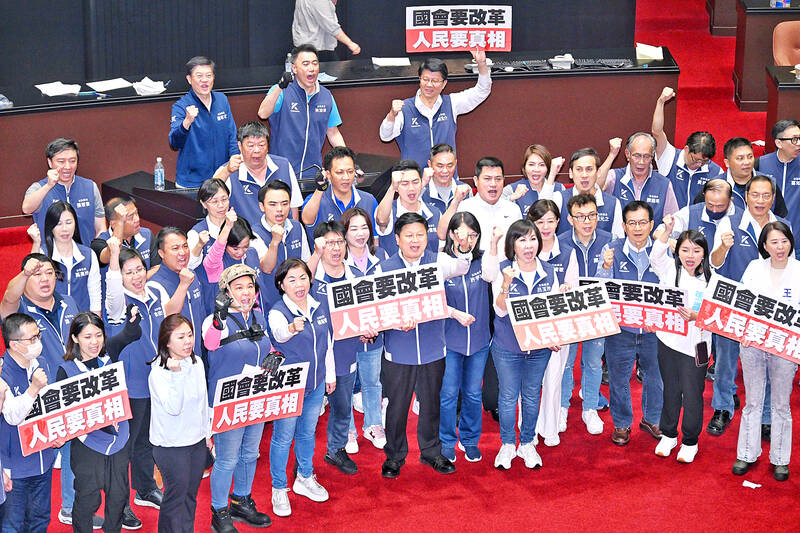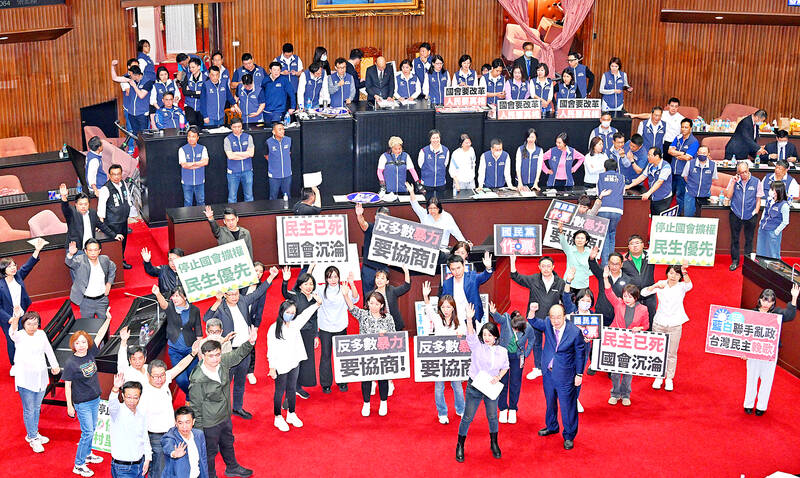After a day of scuffles and disputes, the Legislative Yuan on Friday completed the second reading of amendments that would require the president to make an annual state of the nation address in front of lawmakers and answer questions.
Voting on the amendments to Article 15 of the Act Governing the Legislative Yuan’s Power (立法院職權行使法) proposed by the Chinese Nationalist Party (KMT) and the Taiwan People’s Party (TPP) were held close to midnight after long breaks due to intermittent scuffles and procedural stalling tactics by the Democratic Progressive Party (DPP).
At 12am on Saturday Legislative Speaker Han Kuo-yu (韓國瑜) announced the end of Friday’s legislative floor session, which had started at 9am, and said the proceedings would resume on Tuesday.

Photo: Fang Pin-chao, Taipei Times
Article 15 stipulates that the president can opt to deliver an annual state of the nation address at the Legislative Yuan, although no president has ever done so. The amendment would make the address mandatory.
The amendments would also allow the president to be questioned about the address by lawmakers on the spot, as other Cabinet officials are, rather than having them raise questions that the president can respond to at a later date if they choose, as the law currently provides for.
It is expected that a third and final reading on the two amendments, and a vote on other bills would take place on Tuesday.

Photo: Fang Pin-chao, Taipei Times
A vote on several bills, including legislative reform amendments, had been scheduled for Friday.
However, the bills sparked disputes not only because of their content, but because of the manner in which they were brought to the second reading vote.
The DPP said that they were rushed through the Judiciary and Organic Laws and Statutes Committee and sent to the legislative floor for their second and third readings without any deliberation in committee meetings.
Bills sent to the floor without being hashed out in committee meetings, especially those that would have major consequences, would usually be subject to a delay before a second reading to allow cross-caucus negotiations.
DPP caucus secretary-general Rosalia Wu (吳思瑤) yesterday accused the opposition parties of setting “a terrible precedent” of allowing bills to be voted on the legislative floor without such a process.
KMT caucus secretary-general Hung Meng-kai (洪孟楷) said that the legislative reform bills went through the committee, cross-caucus negotiations and public hearing processes.
Wu also said the votes during Friday’s session were done by shows of hands without recording the names of voters, "which is extremely rare on the legislative floor."
TPP caucus whip Huang Kuo-chang (黃國昌) yesterday said that legislative procedures allow Han to hold votes by a show of hands and the DPP is free to seek to change the rules.
Han had no choice but to resort to a show of hands because lawmakers from the KMT and the TPP had encircled the podium to defend the speaker and could not use the electronic voting devices at their seats, Huang said.
The DPP’s attempt to physically remove the speaker from the podium was designed to prevent voting by forcing the opposition to choose between keeping the podium and their voting devices, when they needed both, he said.
The DPP’s accusation that it was not allowed to review the bills was groundless, as its lawmakers filed about 80 near-identical versions to delay the vote, he added.
The KMT has 52 seats in the 113-seat legislature, while the DPP has 51, the TPP eight and two are independents ideologically aligned with the KMT.
Additional reporting by Lee Wen-hsin

CAUTION: Based on intelligence from the nation’s security agencies, MOFA has cautioned Taiwanese travelers about heightened safety risks in China-friendly countries The Ministry of Foreign Affairs (MOFA) yesterday urged Taiwanese to be aware of their safety when traveling abroad, especially in countries that are friendly to China. China in June last year issued 22 guidelines that allow its courts to try in absentia and sentence to death so-called “diehard” Taiwanese independence activists, even though Chinese courts have no jurisdiction in Taiwan. Late last month, a senior Chinese official gave closed-door instructions to state security units to implement the guidelines in countries friendly to China, a government memo and a senior Taiwan security official said, based on information gathered by Taiwan’s intelligence agency. The

The National Immigration Agency (NIA) said yesterday that it will revoke the dependent-based residence permit of a Chinese social media influencer who reportedly “openly advocated for [China’s] unification through military force” with Taiwan. The Chinese national, identified by her surname Liu (劉), will have her residence permit revoked in accordance with Article 14 of the “Measures for the permission of family- based residence, long-term residence and settlement of people from the Mainland Area in the Taiwan Area,” the NIA said in a news release. The agency explained it received reports that Liu made “unifying Taiwan through military force” statements on her online

Taiwan Semiconductor Manufacturing Co (TSMC), the world’s largest contract chipmaker, said yesterday that it is looking to hire 8,000 people this year, at a time when the tech giant is expanding production capacity to maintain its lead over competitors. To attract talent, TSMC would launch a large-scale recruitment campaign on campuses across Taiwan, where a newly recruited engineer with a master’s degree could expect to receive an average salary of NT$2.2 million (US$60,912), which is much higher than the 2023 national average of NT$709,000 for those in the same category, according to government statistics. TSMC, which accounted for more than 60 percent

Tung Tzu-hsien (童子賢), a Taiwanese businessman and deputy convener of the nation’s National Climate Change Committee, said yesterday that “electrical power is national power” and nuclear energy is “very important to Taiwan.” Tung made the remarks, suggesting that his views do not align with the country’s current official policy of phasing out nuclear energy, at a forum organized by the Taiwan People’s Party titled “Challenges and Prospects of Taiwan’s AI Industry and Energy Policy.” “Taiwan is currently pursuing industries with high added- value and is developing vigorously, and this all requires electricity,” said the chairman